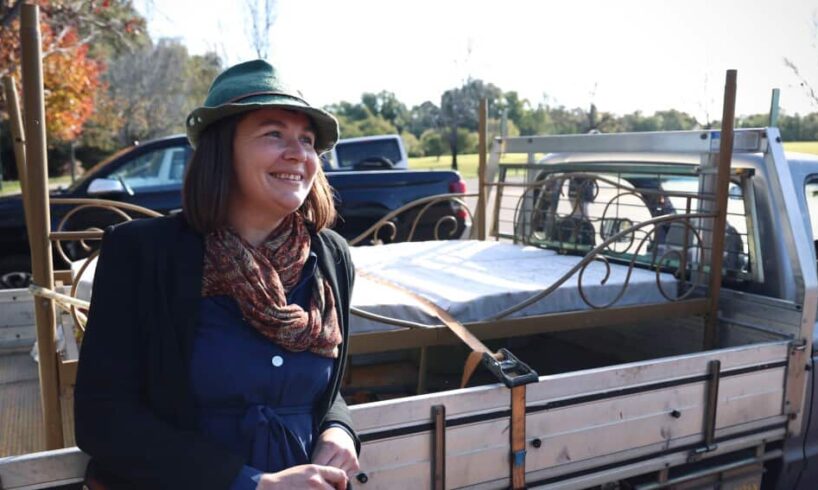
Elizabeth Wright parks her ute beneath the shade of a tree at a quiet suburban park in Perth’s north.It’s not her first time here, and lately she’s been coming more regularly — not for fresh air or a picnic, but to mentally prepare for something more confronting.The 38-year-old single mother gestures to the adjoining car park and says this is where she thinks she’d park on most nights.”I would build a secure load on the back of my ute,” Wright tells SBS News.
“It’s just about condensing life into a vehicle and [to] see what I can fit in the back of it.”
In a quiet moment by the water, Elizabeth Wright reflects on the uncertainty of life without stable housing. As rental prices soar, she’s among a growing number of Australians facing an increasingly fragile future. Source: SBS News / Christopher Tan
Wright, who is on income support, talks through the layout of her single-cab ute, with calm resolve: she’s already planned how to convert it into a sleeping space.”I probably have to get a smaller bed than this … so I can fit a wardrobe on the side … and that’s all I would really need,” she says.
“I always aim for minimalist living but maximalist style, and the past year and a half has really challenged me to do that.”
I can’t have my daughter with me in that space. That’s what’s demoralising, that’s what breaks me.
Wright grew up in Perth and moved around frequently as a child due to her father’s work. Later, she lived with her mum and stepdad until they decided to sell the family home to downsize in July last year.That was when her rental journey began — one she never imagined would lead her to scoping out bedding options for a ute.
But after a year of renting across Perth — and facing three evictions through no fault of her own — she’s rehearsing how to survive homelessness.
A single mother on the brink of homelessness scopes out this park in Perth’s north as a potential place to sleep. With nowhere stable to live, she’s planning how to turn her ute into a last-resort shelter. Source: SBS News / Christopher Tan
For now, Wright is couch surfing at her sister’s rental, another single mother on the verge of being priced out of housing in Perth.
“But, just sort of losing [my] home over and over again, after losing something I’d built myself [and] having to re-set up somewhere else … I am so over moving things,” she says.
Housing pressures most acute for WA renters
Wright’s story is becoming disturbingly common, not just in Western Australia, but across the country.According to a 2025 housing affordability study by Bankwest Curtin Economic Centre (BCEC), capital city house prices have surged by 59 per cent — an increase of more than $373,000 — with Perth and Brisbane recording an 84 per cent growth.Perth’s median house price jumped from $463,000 in 2019 to $851,000 in February 2025, driven by investor interest and population growth. It’s one of the steepest increases for a capital city in the past five years.Despite recent and forecasted interest rate cuts, as well as expanded government first home buying schemes, affordability in Perth is continuing to deteriorate.
But it is renters who are feeling the sharpest edge.
Perth recorded the steepest rise in advertised weekly rents nationwide between 2019 and 2024, outpacing all other capital cities. Source: SBS News
The median advertised rent in Perth has climbed from $350 a week in 2019 to $650 by the end of 2024 — an 86 per cent spike that makes it the least affordable capital city for renters in the country.Along with the Northern Territory, WA is one of the two remaining jurisdictions that still allow “no-grounds” evictions.This describes a scenario in which landlords can evict tenants without providing a reason, as long as they give 30 days’ notice at the end of a fixed-term lease or 60 days during a periodic lease. They can issue an eviction notice even if the tenant hasn’t done anything wrong.There are seven other legal grounds for eviction, including property sales, hardship and tenant breaches.
The lack of protection from no-fault termination leaves renters like Wright vulnerable.
Growing risk of homelessness
According to the most recent Census, 9,729 people were experiencing homelessness in WA in 2021 — a 114 per cent increase from the previous Census. That includes 2,315 people who reported sleeping rough.In the last financial year, Shelter WA says nearly 25,000 people sought help from specialist homelessness services in WA, representing an 18 per cent jump over the decade.Housing advocate Jordan van den Lamb says the crisis is no longer isolated to the most vulnerable.”We’re seeing 10,000 people experience homelessness each month,” he says.
“Most people have felt this pressure in the last three years. Renters are choosing between their rent and medication, groceries, bills.”
Housing advocate Jordan van den Lamb says soaring rents and weak protections are pushing more Western Australians to the brink. “We can’t rely on a market solution to fix a market failure,” he says. Source: SBS News / Christopher Tan
Shelter WA estimates a person earning $70,000 a year would now spend 58 per cent of their income on rent alone.
“I am pretty sure constantly moving out … unless you want to … is not what the great Australian dream is for housing,” Wright says.
The power imbalance
Tenants are increasingly afraid to speak up.Alice Pennycott, principal tenancy lawyer at Circle Green Community Legal, says she sees this fear every day.
“People come to us for advice on repairs, but then they hesitate — worried that if they complain, their lease won’t be renewed,” Pennycott says.
There’s no way to challenge a no-grounds eviction. Unless the notice itself is invalid — the reason doesn’t matter.
Victoria and NSW have scrapped no-fault evictions. NSW introduced reforms in May, allowing landlords to terminate leases only for specific reasons, such as selling the property, renovating, or moving in themselves.Advocates say the WA government is reluctant to act, fearing landlords may exit the market.
But Pennycott says that’s not a justification for inaction.
Alice Pennycott from Circle Green Community Legal is calling for urgent reforms to end no-grounds evictions and improve protections for people at risk of losing their homes. Source: SBS News / Christopher Tan
“We are not saying landlords shouldn’t be allowed to evict people,” Pennycott says.
“We are saying we just want a reason and we are supporting introducing more reasons into the legislation.”
A broken market
Even with 20,500 homes completed in 2024 — the most in seven years — WA still fell short of its National Housing Accord target of 25,000 dwellings.Since March 2023, only 694 new rental dwellings have been added in Perth, which represents a growth of just 0.4 per cent. Over the same period, the population has surged by 119,000, leaving a rental shortfall of 7,700 homes.Vacancy rates have ticked slightly above 2 per cent but remain well below healthy levels.”Rent is going up five times faster than wages,” van den Lamb says. “We can’t rely on a market solution to fix a market failure.”
Even with 3,300 social homes delivered and 5,800 more promised by the WA government, waitlists continue to grow.
Demand for social housing in WA has surged, with the waiting list ballooning and urgent applications rising sharply over the past six years. Source: SBS News
More than 21,000 people are now waiting for public housing. The average wait time is 151 weeks.
Among priority applicants, including people escaping domestic violence or homelessness, demand has jumped 330 per cent in six years.
‘You didn’t choose that life’
For many Western Australians, financial stress is only the beginning.”People used to get a termination notice and say, ‘Well, I’ll just find another rental.’ Now they’re saying, ‘Where am I going to go?'” Pennycott says.
Accessing legal support is becoming more complex, she says.
People are looking for help more than ever because they have fewer alternatives. We hear from people every day who don’t know where they’ll sleep next week.
The cumulative toll on renters like Wright is immense.”If you can’t have your children with you, or you’re both living in a car and you didn’t choose that life, that’s not just hard, it’s dehumanising,” she says.
“How is it that we live in such a beautiful and privileged society, and there are so many people without somewhere to live?”
Systemic change needed
The latest BCEC report titled ‘A long way from home’ outlines a comprehensive plan to tackle WA’s housing crisis, and calls for urgent investment in both rental and public housing.
Short-term recommendations include expanding the Commonwealth Rent Assistance scheme and making the WA Rent Relief Program permanent. The program has already helped over 2,700 renters remain in their homes.
At Circle Green Community Legal, frontline staff take calls from renters facing mounting housing stress. Many are seeking urgent advice after receiving eviction notices or struggling with unaffordable rent hikes. Source: SBS News / Christopher Tan
The report also calls for more crisis and transitional accommodation, particularly for women and families escaping domestic violence.In the medium term, it recommends fast-tracking housing completions, scaling up social and affordable housing using the state’s investment fund, and targeting new developments at first-home buyers and key workers, such as childcare educators, retail and hospitality workers, health support workers, and general administrative services.It also calls for incentives for build-to-rent developments and enforceable standards for rental properties.
Among its long-term recommendations, the report urges the WA government to commit to delivering 24,000 new homes each year — including a minimum of 1,200 new or repurposed social dwellings — and to replace stamp duty with a more efficient system to support household mobility.
Small steps, but a long way to go
In 2024, the WA government updated its Residential Tenancies Act, with the first tranche of changes allowing pets and minor modifications in most rentals and limiting rent increases to once every 12 months.The reforms were introduced in addition to the ban on rent bidding and retaliatory actions from landlords brought in earlier that year.However, there’s still no cap on rental increases.In a statement to SBS News, a state government spokesperson declined to say whether it would abolish “no grounds” evictions entirely.”Recommendations for a second phase of reforms are expected to be finalised for consideration later this year,” the spokesperson said.”Stage two will consider a range of further measures to protect renters, including setting minimum standards, the collection of bonds, rents and other charges, and clear definitions of boarding and lodging.
“Consultation with stakeholders will guide the second phase of these reforms.”
Seen through her office window, tenancy lawyer Alice Pennycott works to support renters navigating an increasingly hostile housing market. She says more and more people are reaching out with nowhere else to turn. Source: SBS News / Christopher Tan
But advocates say these measures barely scratch the surface.”It doesn’t address the heart of the problem: renters being protected from being thrown out into the street into homelessness,” Pennycott says.WA court data shows more than 1,500 eviction applications have been filed annually in the last four years, not including informal or unchallenged cases.BCEC figures also reveal that nearly two-thirds of single women renters in WA aged 55 and over are living in poverty, with half in the “severe poverty” category.”There’s a growing awareness now. Everyone knows someone who’s been impacted — whether it’s rent hikes, eviction, or just the stress of trying to find a place to live,” Pennycott says.
“[But] we’ve been lobbying for change since 2019.”
Sitting beneath the trees by the Swan River, Elizabeth Wright reflects on the emotional toll of housing insecurity. With support systems stretched and options running out, she says no-one should be forced to raise a child from the back of a car in a country as wealthy as Australia. Source: SBS News / Christopher Tan
For Wright, the crisis isn’t just about statistics — it’s about recognising the humanity of renters.
We treat housing as a commodity, but it’s a basic human right.
Wright’s wish is singular: All she wants, she says, is a place to call home again.”I just want to give my daughter a secure place to grow up.
“Not a car, not someone else’s couch. A home.”





